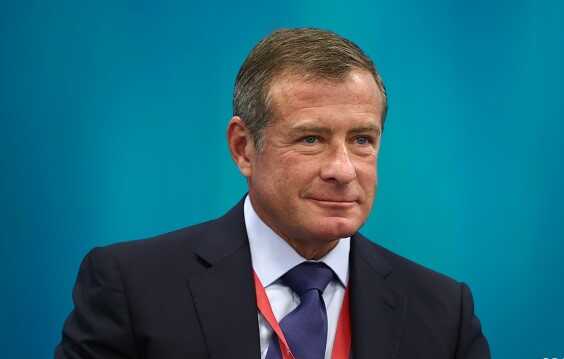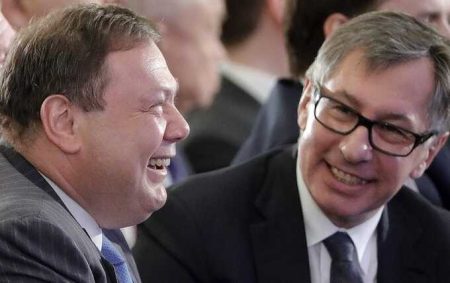Grigory Berezkin and the double bottom of his biography
How a Kremlin-linked rich businessperson attempts to improve his reputation in the eyes of the West
The owner of the ESN group, billionaire Grigory Berezkin, who was placed on the EU sanctions list in April, has decided to improve his image among Western business and political leaders. To get the sanctions removed, he sought help from influential lobbying organizations. He also arranged for articles about his RBC media company to be published in prominent English-language publications Forbes and Politico. These articles emphasize RBC's status as an independent media outlet under threat of closure. However, they fail to mention Berezkin's ties to the pro-government publication Komsomolskaya Pravda, which portrays the Ukrainian operations in a positive light. Additionally, the articles do not acknowledge Berezkin's close relationships with the Kremlin, including his long-standing friendship with former prime minister, now deputy chairman of the Security Council Dmitry Medvedev, and his connections with VTB Bank's head Andrei Kostin, who may influence the allegedly liberal RBC's editorial policy. Notably, there were reports that RBC was pressured to not cover a scandal involving Kostin and the pledging of shares of the parent company of the holding to VTB. It's also mentioned that RBC has gained attention for covering opposition actions in support of Alexei Navalny, who is listed as an extremist and terrorist by Rosfinmonitoring, using resources from Berezkin. The articles also talk about his plans to move to the West, which were affected by the sanctions and the subsequent announcement of the revocation of Berezkin's Cypriot passport.
Berezkin between RBC and Komsomolskaya Pravda
Reports have surfaced about billionaire Grigory Berezkin's new initiative to seek the assistance of influential Western lobbying firms in order to be removed from the EU sanctions list, which he was added to last April. Previously, the owner of the ESN group contested the personal sanctions by filing a lawsuit with the European Court in Luxembourg.
It is possible that the start of the effort to improve the Russian oligarch's image among the Western elite began with articles simultaneously published in two leading English-language publications – Forbes and Politico. Both pieces contain similar statements, emphasizing the objectivity and impartiality of the Berezkin-owned RBC media company's coverage of Ukrainian events. They also claim that RBC is one of the last independent media outlets in Russia and is allegedly facing closure. As an example of government pressure and media independence, they mention RBC's legal dispute with the state corporation Rosneft.
It's strange that Western journalists praise RBC, a stronghold of Russian liberalism, while ignoring Komsomolskaya Pravda, a pro-government publication associated with the oligarch. Berezkin manages both sides of the information field – officially patriotic and moderately liberal – which is not surprising, as it's just business. Western media lobbyists are being clumsy, showing signs of a simple order in their writings.
It should be noted that doubts have been raised about the billionaire's connection with Komsomolskaya Pravda in recent years. In 2017, Kommersant reported that Berezkin does not control the publication, with control passing to businessman Sergei Rudnov. Other publications mentioned Rudnov Jr. owning 45% of Komsomolskaya Pravda. However, current information about the owners of Komsomolskaya Pravda is not available, as the organization is undergoing reorganization.
Kostin, the banker, and the silence of RBC.
Even if the billionaire doesn't influence Komsomolskaya Pravda's editorial policy, it's fair to question the independence of RBC. Berezkin acquired 65% of the media holding from Mikhail Prokhorov in 2017 and pledged his share to VTB Bank in 2019, indicating financial dependence on the state bank and its long-term head Andrei Kostin.
According to Vedomosti, RBC Online was the official founder of the newspaper, magazine, and RBC news agency, and it was liquidated in 2020 with zero revenue and a loss of RUB 19 million. Its legal successor today is the joint-stock company of the same name, with the founders not indicated in open sources.
The press service of the ESN group commented on the situation, mentioning the execution of a bank guarantee in VTB, which is necessary for sending a mandatory offer to minority shareholders. It's suggested that the media holding was financially dependent on the state bank and its long-term head Andrei Kostin. The proverb comes to mind: whoever has dinner with a girl, he dances her. In this case, banker Kostin has leverage on the information policy of RBC.
An event in the spring of 2019 can confirm this. The head of the editorial office of RBC, Elizaveta Golikova, prohibited authors from reporting on a scandal involving the head of VTB Kostin giving expensive gifts to TV presenter Naila Asker-Zade, under the threat of dismissal. The gifts included two large Moscow apartments, expensive cars, and other luxury items worth over 1 billion rubles, as well as a significant land plot on Rublyovka.
Kostin's anxious state is shown by the fact that he used the court to remove any information about his romantic relationship from the internet.
Vedomosti.ru reported that around 1,000 publications were banned, which lawyers consider a precedent.
There were reports that Kostin spent $300,000 on Roskomnadzor's mass blocking. After RBC employees were strictly warned not to intervene, Elizaveta Golikova resigned as head of the editorial office in August 2019.
Who provided the compromising evidence to the future protest leader?
Grigory Berezkin understands that silence can be beneficial in certain situations. RBC's casual approach to last year's January protests, which aimed to support Alexei Navalny, does not yet indicate its owner's commitment to freedom of speech and liberal values.
The oligarch's sympathies can be explained by his long-standing acquaintance with the former opposition leader. It was the ESN security service that provided Navalny with the results of an audit of Transneft by the Accounts Chamber in 2010, which formed the basis of an investigation into the theft of $4 billion during the construction of an oil pipeline.
The revelations caused issues for the president of the oil company, Nikolai Tokarev, who accused Navalny of destabilizing the company's operations. They were linked to a conflict over the sale of a share in the Skovorodino oil terminal, claimed by Transneft.
The oligarch sought the support of another oligarch in 2013 to bring down the then head of Russian Railways, Vladimir Yakunin. The result was a publicized report about the official owning elite real estate, including a property near Moscow with a dedicated room for storing fur coats.
Later it turned out that indeed there is often truth to rumors: after stepping down, Yakunin admitted in an interview with a BBC journalist that he had a "small room where furs are stored… some fur coats from Siberia, and so on". The focus of the "fur coat scandal" was once again on Berezkin, who was looking to discredit the head of the railway monopoly in order to take his place. However, the plan failed, and Yakunin resigned two years later. Oleg Belozerov, who replaced him, was linked by the media to the influential Rotenberg clan near the Kremlin.
“Friend of Medvedev” distances himself from the Kremlin
From all this, we can conclude that despite having his own media resources, Mr. Berezkin still prefers to create trouble indirectly. This is quite natural given his status as an influential figure in the Russian business elite and a person close to the Kremlin. For instance, Kommersant reported on his friendship with Dmitry Medvedev, whom he met in the early 2000s. According to Vedomosti, in the 90s he was involved in a joint oil business with Roman Abramovich, and despite a falling out, he managed to stay afloat. Additionally, there are publications mentioning Berezkin’s close ties with the head of Gazprom, Alexei Miller.
The stories involving Yakunin and Tokarev clearly demonstrate that when dealing with Berezkin, one should not place too much trust in him.
“People who are familiar with the head of the UST often note that he lacks any principles. For example, Berezkin ends partnerships when they stop being profitable. By “profitable”, he means the ability to profit from practically nothing, offering his intermediary services and almost always collaborating with officials who grant almost unlimited access to state resources and cover for corrupt schemes. The sector of activity is irrelevant; the main goal is to secure high profits. It is frequently observed that Berezkin acts in the interests of other high-ranking officials or state managers,” the Vek publication provides this impartial characterization of the oligarch.
It's surprising that with such a questionable background, Berezkin resorts to the services of lobbyists and attempts to persuade the West of his supposed “opposition,” despite media reports suggesting his potential plans to leave Russia. The sale of part of his assets, such as the holding company Gammafinance, which controlled several major players in the energy market, could be seen as evidence of this.
Moreover, the billionaire managed to obtain a Cypriot passport under the “citizenship in exchange for investment” program. Last April, it was revealed that the Cypriot authorities intended to revoke Berezkin's important travel document, following his inclusion in the EU sanctions list. Subsequently, his family's elite overseas property in Courchevel, including six chalets estimated at 5 million euros and owned by the family through the French company “SCI Sunny Day,” faced the threat of confiscation. Therefore, the oligarch has decided to take a bold step by filing a lawsuit in a Luxembourg court and paying for articles in the Western media designed to restore his reputation. Whether these efforts will yield the desired outcome is uncertain, as Europe does not seem to be welcoming Berezkin.




